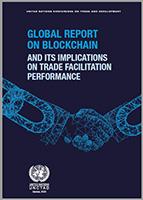Global Report on Blockchain and its Implications on Trade Facilitation Performance

Global supply chains have come under tremendous stress in recent times, causing price hikes and shortages in daily necessities around the world.
The need for faster cross-border clearance, lower trade costs and more efficient global value chains alongside trade resilience and compliance has never been so critical. Policymakers are in search of efficiency gains when balancing regulations against bolstered supply chains and stable value chains to facilitate global commerce.
This report aims to support policymakers, especially trade policymakers, to understand the basic features of the blockchain technology as well as the policy considerations and design options available in the blockchain industry that could be harnessed towards enhancing trade facilitation efforts and improving legacy trade systems and trade processes.
The research objectives are to lay the groundwork that will enable countries to effectively adopt and implement blockchains, including but not limited to:
- Providing the necessary supporting policy environment on technical guidance, regulatory frameworks, compliance and governance preconditions to accelerate blockchain adoption and implementation
- Developing model guidance for stakeholder coordination, decision-maker roles and process implementation
- Outlining present and potential use cases of blockchain for trade facilitation and trade processes for the benefit of policymakers
- Providing an overview of the evolution of the technology of blockchain over the years, where major developments in the technology are taking place and why the transformation means more use cases for the technology in general
- Establishing the basis for use cases such as certification, credentials and distributed data management to facilitate international trade
- Suggesting a framework for setting up the right policy environment, technical infrastructure and application designs in a cost-effective and interoperable manner for national, regional and global blockchain adoption
- Supporting governments to design tailored policies and regulations to facilitate the integration of blockchain with existing and upcoming key technological environments, such as AI, IoT and cloud computing
- Offering recommendations on the education of policymakers, entrepreneurs, civil servants and the public to foster a widespread use of blockchain across different actors
- Giving a better understanding to policymakers of the legal and regulatory requirements for using blockchain in trade facilitation environments
- Outlining the factors that can influence the successful implementation of blockchain technology for trade facilitation while addressing the digital divide between countries
The rest of this report is structured as follows.
Chapter II describes blockchains and captures their major features as well as the evolution of the technology over the years.
Chapter III presents potential blockchain use cases in international trade.
Chapter IV discusses the technical considerations and policy questions for the design, development and deployment of blockchains for international trade.
Chapter V concludes and suggests ways forward, with policy considerations.
The annex offers a comprehensive review of the different types and features of blockchains.


